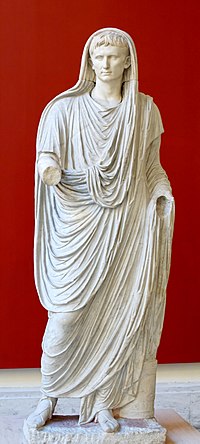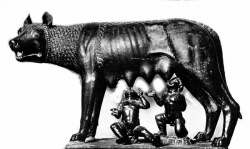Pontifex maximus
Pontifex maximus

The pontifex maximus was the chief high priest early ancient Rome and held the most important position in Imperial Cult of Rome and the head of the Collegium Pontificum.
The office of pontifex maximus originally was open only to patricians until 254 BC, when a plebeian first occupied this post.
The Pontifex maximus was distinctly religious office under the early Roman Republic second to the office of Tribunicia potestas. They both became politicized beginning with Augustus Caesar.
The term pontifex literally was a symbol in language meant a "bridge-builder" according to Marcus Terentius Varro[1] Equestrian writer of the Latins and the Classical Attic Greek historian Dionysius of Halicarnassus.
Dionysius' discusses, in his writings like Roman Antiquities, topics like the Separation of power and the Roman law governing marriage declaring that wives would share equally in the possessions and conduct of their husband.
The wolf and the prostitute

Dionysius also offers a "non-fantastical" version of Romulus and Remus' birth, survival, and youth, raised by a "lupa" (Latin for "wolf") named Laurentia who was prostitute. According to Plutarch lupa (she-wolf) a common term for her profession.
The records of early ancient Roman history was lost around 390 B.C. and we have to often rely upon interpretation. Overtime the ways of the ancients were forgotten and the virtue of their fathers was no more.
Culture grows a strong society that may become wealthy and soft producing a weak generation. Wealth alone should not degenerate society but certain practices or their neglect can open a door to a way that does not strengthen the poor and weak of society.
Ancient stories, myths and tales often carry messages within metaphors and allegories for their next generation. Even rituals and rites may have deeper meanings. If the people unmoore the message hidden in the rights and rituals the meaning can be lost.
The three major Roman priesthoods between 218 to 167 B.C. were the pontifices, the augurs, and the decemviri sacris faciundis. While some of these groups date back to before the Republic their role in society changed as other elements of society changed.
Temples were not originally building but places to gather for a purpose. In early Israel and the ancient of days the Altars of clay and stone were part of a welfare system that kept men free and drew society through their freewill offerings nearer the character of God the Creator.
There are system that depend on charity that draws society together creating social bonds. This was the purpose of those altars and early temples. Through sophistry the natural use of those Altars was changed. The priests engaged in superstition and often became rich, and even powerful.
Julius Caesar first job was flamen Dialis (high priest of Jupiter). But because he fell out with Sulla because he supported Marius his uncle against Sulla during a civil war. From there he went into the military. The combination of these to worlds was the one Separation that was essential like the left hand and the right.
If you need help:
- Or want to help others:
Join The Living Network of The Companies of Ten
The Living Network |
Join Local group |
About |
Purpose |
Guidelines |
Network Removal
Contact Minister |
Fractal Network |
Audacity of Hope |
Network Links
Religion |
Pure Religion |
Private welfare |
Fleeing Religion |
False religion |
Public religion |
Our Religion |
Christian conflict |
Corban |
Baptism |
Benefactors |
That Word |
Daily ministration |
Modern Christians |
Diocletianic Persecution |
Christians check list |
gods |
Judge not |
Judge |
Fathers |
Deist |
Damnable heresies |
Factions at the altar |
Pharisees |
Sadducees |
Zealot |
Essenes |
Levites |
Messianic Judaism |
Menahem the Essene |
Sanhedrin |
Altars |
Clay and Stone |
Red Heifer |
Golden calf |
Freewill offerings |
Religion |
Pure Religion |
Public religion |
Christian conflict |
Paganism |
Denominations |
Dispensationalism |
Benefactors |
Corban |
Daily ministration |
Calendars |
Cult |
Imperial Cult of Rome |
Guru theories| |
Covet |
Merchandise |
Mark of God |
Mark of Cain |
Mark of the Beast |
Nature of the Beast
Section 666 |
Benefactors |
Biting one another |
Cry out |
Worship |
Church |
Temples |
Religious Orders |
Priests |
Kings and priests |
Hear |
Bible Index |
Network |
Footnotes
- ↑ Varro was also a general who was also learned in many areas. He often got into trouble politically like though he had led soldiers under Pompey he ridiculed the First Triumvirate coalition in his "Three-Headed Monster". He need pardon numerous times from Julius Caesar to August Caesar.